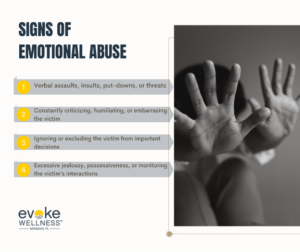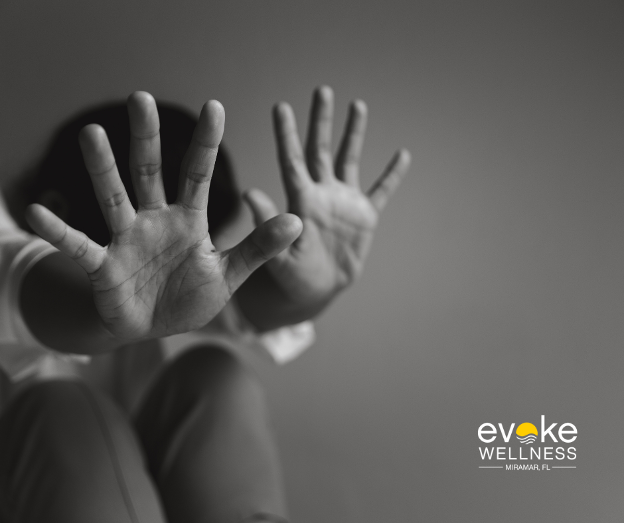You may feel trapped in an abusive relationship, but there are ways to overcome the trauma. Emotional abuse affects over 15 million adults each year in the United States alone. The trained professionals at Evoke Wellness at Miramar understand the complexities of emotional abuse and provide comprehensive treatment, including:
You deserve to feel safe, understood, and empowered. We’re here to help you reclaim your self-worth and start the healing process. You are not alone.
Together, let’s embrace the journey to recovery and the promise of a new beginning. Call us at (833) 819-6066 today or reach out online.
What Is Emotional Abuse?
Emotional abuse is a form of abuse that involves non-physical behaviors or attitudes designed to control, isolate, or intimidate a partner. According to the National Domestic Violence Hotline, emotional abuse chips away at the victim’s self-worth and can include:

Impact on Mental Health
Emotional abuse can have severe impacts on mental health, including depression, anxiety, PTSD, and substance abuse issues. At Evoke Wellness at Miramar, we offer specialized treatment programs to help victims heal:
Treatment Options
Our comprehensive approach combines individual and group therapies to address the root causes. Evidence-based modalities like CBT, DBT, and EMDR are used:
- Individual therapy program
- Group therapy
- Cognitive Behavioral Therapy (CBT)
- Dialectical Behavior Therapy (DBT)
- Eye Movement Desensitization and Reprocessing (EMDR)
If you or a loved one is suffering from emotional abuse, know that you are not alone. Seek professional help to break free from this cycle and regain your self-worth.
Signs of Emotional Abuse
Emotional Withdrawal
Emotional abuse often manifests through signs of trauma responses like emotional numbing, avoidance of certain situations or people, and feeling constantly on edge. Victims may shut down their emotions as a coping mechanism, leading to difficulties forming meaningful connections. This emotional withdrawal can severely impact personal relationships and overall well-being.
Mood Disturbances
Those experiencing emotional abuse commonly exhibit signs like mood swings, lack of motivation, and disrupted sleep patterns – indicative of underlying mental health issues. Unresolved trauma can trigger conditions like depression, anxiety, or PTSD, further exacerbating the emotional turmoil. Seeking professional help through programs focused on trauma recovery is crucial.
Substance Abuse
Emotional abuse survivors may turn to substance abuse as an unhealthy coping mechanism, displaying behaviors like doctor shopping, ignoring responsibilities, or continued use despite consequences. Addictive tendencies can spiral into full-blown substance use disorders, requiring comprehensive dual diagnosis treatment plans addressing both addiction and mental health needs simultaneously.
Recognizing these signs is the first step towards breaking free from the vicious cycle of emotional abuse. With specialized trauma-informed care through individual and group therapy modalities like CBT, EMDR, and holistic practices, survivors can begin healing their emotional wounds and reclaim their lives.
Types of Emotional Abuse
Emotional abuse can take many insidious forms. According to the Evoke Wellness blog, it often manifests as an uncontrolled “emotional spiral” of escalating negative thoughts and feelings like fear, anxiety and distress. This toxic cycle can stem from past trauma, stressors or mental health issues. Left unchecked, it drastically impacts wellbeing and relationships.
Verbal Assaults
Belittling, bullying, harsh criticism and name-calling are hallmarks of this type of abuse. The perpetrator uses insults and put-downs to erode self-esteem and assert control. Evoke’s dual diagnosis program provides trauma-informed therapy to help heal from such experiences.
Emotional Neglect
Ignoring feelings, withdrawing affection and silent treatment deprive the victim of emotional sustenance. This chronic disregard and lack of support cultivates feelings of abandonment, insecurity and unworthiness.
Domination and Control
Tactics like excessive monitoring, unreasonable demands and isolation aim to strip autonomy from the abused. The abuser may restrict access to finances, social circles or even basic needs to exert power. Evoke’s therapies like CBT and DBT help regain emotional regulation skills.
Recognizing these patterns is vital, as emotional abuse often coexists with substance use disorders. With comprehensive mental health support, you can break free and heal.
Effects of Emotional Abuse
Emotional abuse takes a severe toll on mental health, often leaving long-lasting scars. The National Domestic Violence Hotline reports nearly half of all women and men have experienced psychological aggression by an intimate partner. Its effects can be devastating:
Trauma and Mental Health Issues
Emotional abuse frequently causes trauma, anxiety, depression, low self-esteem, and PTSD. Victims may develop substance abuse disorders to cope with the pain, creating a vicious cycle of addiction and worsening mental health. This dual diagnosis requires comprehensive treatment targeting both issues.
Emotional Instability
Those who endure emotional torment commonly experience severe mood swings, emotional detachment, and psychotic episodes. The constant barrage of insults and manipulation can shatter confidence and distort reality. Counseling is crucial to counter these effects and rebuild self-worth.
Lasting Depression
Unresolved trauma from emotional abuse is a leading cause of clinical depression. Self-medicating with drugs only provides fleeting relief, while depression persists without proper therapy. Dual diagnosis programs address both addiction and depression holistically for lasting recovery.
Overcoming emotional abuse requires compassionate, evidence-based treatment plans like those at Evoke Wellness. With support, survivors can heal and reclaim their confidence and peace of mind.
Healing From Emotional Abuse
Emotional abuse leaves deep scars that require intentional healing. According to Stanford’s Human-Centered AI report, AI advances offer new trauma therapy tools. At Evoke Wellness, our comprehensive approach empowers your journey.
Counseling for Transformation
Individual and group counseling foster self-discovery and personal growth. Therapies like EMDR, CBT and DBT help process trauma. You’ll gain insights and coping strategies in a supportive environment.
Holistic Healing
Mindfulness practices like yoga reconnect you with your body. Creative outlets and peer support groups reduce isolation. Our holistic approach nurtures your physical, mental and spiritual well being.
Family Involvement
Emotional abuse strains relationships. Family therapy rebuilds trust and communication. Your loved ones gain insights into your experience while you develop healthier dynamics.
With compassionate care, you’ll break free from emotional abuse’s grip. Your resilience will inspire others on this powerful healing path.
Emotional Abuse FAQs
What is emotional abuse?
Emotional abuse refers to a pattern of behavior where one person systematically controls, demeans or diminishes another through tactics like verbal attacks, threats, humiliation or intimidation. It is a form of complex trauma that can have long-lasting impacts on mental health and wellbeing.
How common is emotional abuse?
While statistics vary, emotional abuse is considered highly prevalent. Trauma therapy programs are often needed to address the effects, which can include depression, anxiety, PTSD and difficulty regulating emotions.
What are signs of emotional abuse?
- Constant criticism, insults or put-downs
- Extreme jealousy or possessiveness
- Isolation from family/friends
- Threats of harm or abandonment
- Gaslighting or denying one’s experiences
- Strict control over finances/activities
How can therapy help?
Evoke Wellness offers trauma-informed treatment utilizing evidence-based therapies like EMDR, CBT and DBT in individual and group settings. This comprehensive approach can help process traumatic experiences, build coping skills and restore self-worth.
Conclusion
Overcoming Emotional Abuse: You Are Not Alone
In closing, know that you are not alone. Emotional abuse impacts over 10 million adults in America each year. However, there are many treatment options available that can help you recover:
- Mental Health Treatment Program – Work with a licensed therapist to process trauma and build coping skills.
- Anxiety Treatment Program – Learn strategies to manage anxiety through counseling, medication, or both.
- Depression Treatment Program – Treat underlying depression through psychotherapy, medication, or other evidence-based approaches.
- PTSD Treatment Program – Heal from past trauma through therapies like EMDR, exposure therapy, and more.
- Individual Therapy – Get support tailored to your unique situation and needs.
- Group Therapy – Connect with others going through similar struggles.
- CBT – Change negative thought patterns through Cognitive Behavioral Therapy.
- DBT – Build life skills to handle emotions through Dialectical Behavior Therapy.
You have the power to break free. Reach out today to get the help you deserve.
Begin Your Journey with Evoke Wellness at Miramar
If you or a loved one is considering treatment, Evoke Wellness at Miramar invites you to contact us. Our compassionate team is ready to answer your questions, discuss your needs, and help you take the first steps toward recovery. In Miramar, you’ll find more than just a treatment program – you’ll discover a community dedicated to your wellness and success. Together, let’s embrace the journey to recovery and the promise of a new beginning. Call us at (833) 819-6066 today or reach out online.


